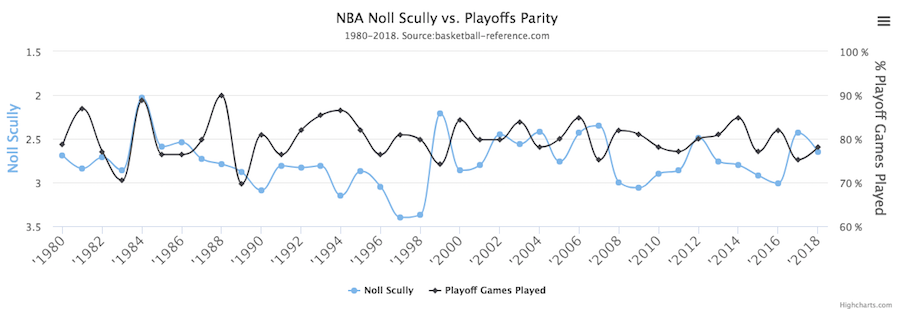The fact that the NBA Finals have been a repeat going on four years now, and that the Warriors "rule" the NBA, a classic myth has emerged. The lack of parity in the NBA could ruin the sport! DeMarcus Cousins joining the Warriors certainly doesn't help things, but we'll talk more about that later. Of course, the NBA has never been fair. But what's more, the issue isn't superteams, or "lack of parity," it's a broken playoff system!
Two Ways to judge parity
Let's talk two ways to judge parity in the NBA. The first is the Noll-Scully. Prepare for stats class (or nap time!). Pretend we had a fair league. The NBA has an 82 game season; you might expect a fair league would have every team win 41 games. In reality though, if all teams were even, we'd have a distribution of wins and losses with an average close to 41. In the NBA, if the league was full of 30 even teams, we'd expect almost all of the teams to be within 30 and 52 wins. This is not the case. The Noll Scully is a metric that tells us how close teams are to this. At 1.0, the league is "fair," at 2.0, it's pretty unfair. The modern NBA is regularly above 2.0, and often gets above 3.0! Let's keep in mind; this is a regular season metric. So let's show the chart, explain the playoff metric, and get to some analysis!

Here's another metric, not as standard as the Noll-Scully though. Let's pretend the playoffs went the distance in every series. We can then calculate how close each year's playoffs got to this. In the NBA this oscillates between 60% and 90%. Much simpler than the Noll Scully! Above I've charted those two against each other (note the Noll-Scully axis is inverted) The higher both numbers are, the fairer the league is. And what we notice is, how fair the NBA in the regular season doesn't tie that well with how fair the NBA is in the playoffs. Let's make a few fun notes though.
The NBA got "fairer" after Kevin Durant and LeBron James made their respective moves.
1984 was the pinnacle of fairness in the regular season and playoffs!
1999 was the opposite, where the league got fairer, but the playoffs were relatively short.
Alright, let's see if we can explain how the NBA can get "fairer", but not tie to playoff results. That's super easy:
Playoff Seeding
Fans of college football routinely get upset at the BCS system, which dictates who goes to what bowl game. Of course, the reality is college football is too random for such a small season to decide who the best teams are for sure. The NBA is a different story. By the end of the regular season, it's pretty obvious who the best teams are.
The NBA does something silly though. Like many playoff systems, the NBA seeds it so that better teams play worse teams initially. The ridiculous part is the NBA first splits up their teams by which conference they are in first. They used to have silly rules based on divisions too, a topic for another day. Anyway, let's show another chart. Here's how many teams in the top 20 percentile, by wins, came from each conference each season.

Fun note, this year was the first season since 1989 the East had more teams in the top twenty percentile than the West (of course, the Raptors were the only team close to the top of the West, and they flamed out). But we can see a very real disparity. The West routinely has more top teams than the East. So in the Playoffs, being in the Western Conference can hurt good teams. In the East though? It means the top teams play weak competition early on.
As a Nuggets fan, here's a frustrating reality. The Nuggets won 46 games this season and missed the playoffs. Three of the bottom eight seeds out East had a worse record than the Nuggets!
The Fix
For years the NBA has tried fixes from how teams can draft the best players, how much they can play the best players, and how they can keep their good players. Now, the NBA will never solve their parity problem until we can clone the best players. But it could fix the playoff problem if it would stop deciding who gets in based on geography, and just let the best teams in, and seeded them better. Of course, it turns out fans don't seem to care about a fair NBA (with their wallets or eyes), no matter how much they complain about it. So perhaps it's not worth worrying about.
-Dre